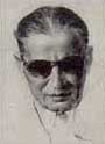(1889-1973)
Taha Hussein was born in al-Minya province, Upper Egypt, in 1889. He was the seventh of thirteen children in a lower middle-class family. He contracted an eye infection which left him blinded at the age of three.
His elementary education was in the kuttab, where he studied the Qur’an. He attended King Fouad University, and was the first graduate of this university to be granted a doctorate. His dissertation, written in 1909, was on Abul-alaa’ al-Ma’arri, an Arab philosopher-poet.
He continued his studies at the Sorbonne in France, and was the first Egyptian to be granted both a master’s and a doctorate degree. His second dissertation, written in 1917, was on Ibn Khaldun, the 14th century Arab historian.
While at the Sorbonne he met the woman who would become his wife; Suzanne, who read to him from references that were not available in Braille. She became his wife, mentor, advisor and assistant, and best friend. They had two children. After his death, she wrote "Ma'ak" (With You), a remembrance of their life together.
In 1919, Hussein was professor of history at Cairo University, the former King Fouad University. Later he was appointed dean of the university, interim president, and he was a founder of Ain Shams University.
Hussein’s first book, “Selected Pages from Greek Dramatic Poetry”, written in 1920, was an incomplete attempt at an expose of Greek poets and their works. His second book, “The Athenian System”, written in 1921, was a translation of Greek history of civilization.
His work can be divided into three categories: scientific study of Arabic literature and Islamic history; novels with a clear social consciousness that calls for justice; and political articles which he published in the two papers of which he was editor-in-chief. His novels had a great influence on modern Arabic literature.
He waged many battles for enlightenment, for the respect of reason and thought, and for women’s emancipation.
When he assumed office as Minister of Education in 1950, he managed to put his motto, "Education is like water we drink and the air we breath," into practice. He succeeded in making all elementary and secondary education compulsory and state-supported.
During his lifetime he was elected member of many educational institutions in Arab countries and was granted honorary doctorates from the universities of Oxford, Madrid, and Rome.
President Gamal Abd al-Nasser bestowed on him the highest Egyptian decoration, normally, reserved for heads of state. In 1973, he received the United Nations Human Rights Award.
Taha Husein died in his home in October 1973.
Reference: http://www.sis.gov.eg/En/Arts&Culture/


